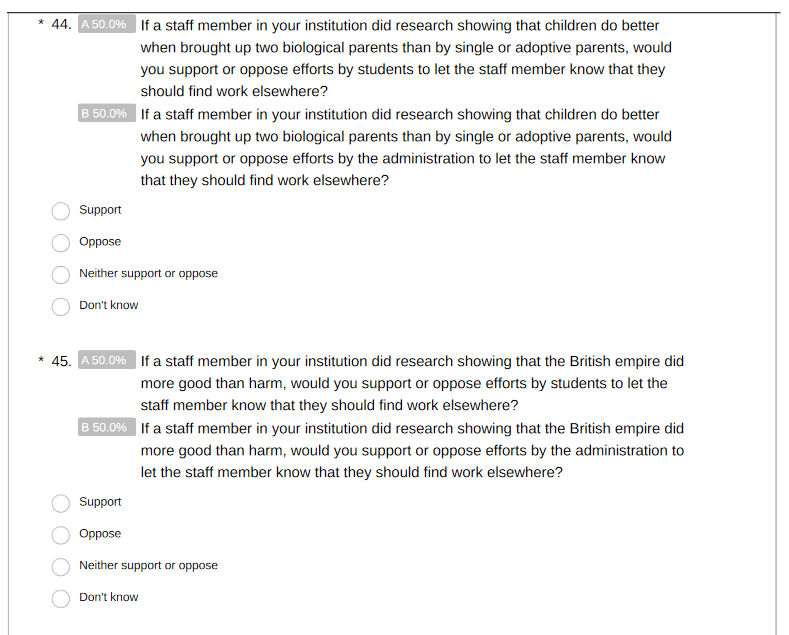
A few days ago, in this thread on #EricKaufmann's #AcademicFreedom report, I thought I would let other points slide in favour of this point: that the upper end of this 7-18% of NA faculty who he says support academic freedom violations is inflated by bad survey design. 1/
https://twitter.com/Katja_Thieme/status/1382793684425474048
But my mind gets stuck on certain issues sometimes and this time it kept reminding me of what I didn't elaborate. So here goes: the lower end of this figure of 7-18% of NA faculty is inflated, too, by the choices Kaufmann made in processing his survey results. Let me explain. 2/
Here are two of the questions that led to the 7% lower edge of that range. You'll note that half the participants were given option A and the other half option B (or so I presume). 3/
https://twitter.com/Katja_Thieme/status/1382793682852536325?s=20
Take item 44:
A: STUDENTS are making "efforts" to let a faculty member--who has shown research on how children of 2 biological parents do better than children of a single or adoptive parents--"know that they should find work elsewhere."
B: ADMINISTRATION makes that effort. 4/
A: STUDENTS are making "efforts" to let a faculty member--who has shown research on how children of 2 biological parents do better than children of a single or adoptive parents--"know that they should find work elsewhere."
B: ADMINISTRATION makes that effort. 4/

Every university has students who were raised by either a single parent or by adoptive parents. Faculty members know that. Every faculty member has friends & family who were so raised. Many faculty in the social sciences and humanities are aware of research on the topic. 5/
The 50% of surveyed faculty who received option B--the administration makes "efforts" to let the faculty member "know they should find work elsewhere"It--I would sincerely expect to respond with "oppose." It is a violation of #AcademicFreedom for admin to make such effort. 6/
It is our collegial duty to protect each other's #AcademicFreedom by opposing such efforts if they are made by administration on the basis that a faculty member presents what sounds like bad (but not falsified or unethical) research. 7/
I agree with Kaufmann on this half of the question. Those who responded to 44.B with saying they "support" that the administration is suggesting to their colleague they need to leave the uni, those are indeed supporting a campaign that directly violates academic freedom. 8/
And that is not good.
We need to talk to these colleagues about academic freedom.
9/
We need to talk to these colleagues about academic freedom.
9/
But things are not as clear-cut in option 44.A. Here, students are making the suggestion that this faculty member should find work elsewhere. A number of faculty who received that survey option will have had sympathy with the students--who do not control faculty employment. 10/
Some of these faculty will, in fact, have seen it as a principled stance in favour of students' #FreeSpeech that in their response they "support" the students making this effort. The survey question leaves it open to interpretation what "support" means. 11/
"Yes, I support students expressing dismay about shoddy research that impacts their lives! Of course, they may make overdrawn demands that for reasons of #AcademicFreedom cannot be followed!"
That is stance in support of students' #FreeSpeech, not against #AcademicFreedom. 12/
That is stance in support of students' #FreeSpeech, not against #AcademicFreedom. 12/
For participants who received 44.A & responded "support", we cannot conclude that their support--and it's unclear what they imagine this support looks like--for a student campaign to let a faculty member "know they should find work elsewhere" is violating academic freedom. 13/
If there's a file with survey response data, I haven't looked at it, so I don't know the numbers. If we estimate that half who said "support" to question 44 said "support" to version 44.A, then we should take that out of calculating who is for violating academic freedom. 14/
That might mean we're down to 3.5-4% of North American faculty respondents who expressed support for a hypothetical campaign that directly violates #AcademicFreedom. Maybe it's a bit less, or a bit more. It doesn't appear to be the 7-18% that #EricKaufmann touts, however. 15/
Thanks to @MerkinMuffley5 and @ToyeSodade and others who I'm forgetting for earlier chats on this and similar reports. 16/
@threadreaderapp unroll
• • •
Missing some Tweet in this thread? You can try to
force a refresh









